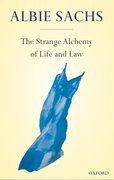 Albie Sachs is a remarkable man. His official bio begins
Albie Sachs is a remarkable man. His official bio begins
On turning six, during World War II, Albie Sachs received a card from his father expressing the wish that he would grow up to be a soldier in the fight for liberation.
He began that fight as a seventeen year old law student; as a lawyer, the bulk of his work involved defending people charged under apartheid’s racist and repressive security laws – many of them faced the death penalty. As a result he was harassed by the security police, detained in solitary confinement for two prolonged spells of detention, tortured by sleep deprivation, forced into exile in 1966, and in 1988 blown up by a car bomb which cost him his right arm and the sight of an eye. In exile, he worked as an academic in the UK and Mozambique, campaigned for human rights and an end to apartheid, and thought deeply and wrote widely about the role of law as a protector of human dignity in the modern world. He wrote many of the ANC’s constitutional documents, helped to negotiate South Africa’s transition to constitutional democracy and to draft its post-apartheid Constitution, and was one of the founding judges of the Constitutional Court in 1994. The Court’s first hearing, in S v Makwanyane (CCT3/94) [1995] ZACC 3 (6 June 1995) (also here), concerned the constitutionality of the death penalty, which it unanimously found to be unconstitutional. As his term on the Court nears its conclusion, he has written a beautiful memoir The Strange Alchemy of Life and Law (OUP, 2009); from the publisher’s website:
The book provides unique access to an insider’s perspective on modern South Africa, and a rare glimpse into the working of a judicial mind. By juxtaposing life experiences and extracts from judgments, Sachs enables the reader to see the complex and surprising ways in which legal culture transforms subjective experience into objectively reasoned decisions. With rare candour he tells of the difficulties he has when preparing a judgment, of how every judgment is a lie. Rejecting purely formal notions of the judicial role he shows how both reason and passion (concern for protecting human dignity) are required for law to work in the service of justice.
Two of his judgments will help to give the measure of the man as a judge. First, in Minister of Home Affairs v Fourie (CCT 60/04) [2005] ZACC 19 (1 December 2005) (also here) he held that the definition of marriage as between a man and a woman was inconsistent with the Constitution since it excluded same-sex couples, and the failure to provide them the means to enjoy the same status, entitlements and responsibilities accorded to heterosexual couples through marriage constituted an unjustifiable violation of their rights. And in S v M (CCT 53/06) [2007] ZACC 18 (26 September 2007) (also here) he reversed a prison sentence on a woman primarily because it would infringe the human rights of her three children. He tells the story of the former case in this extraordinary University of Chicago talk; he tells the story of the latter case in this fascinating Guardian interview; and there are wonderful pieces (part interview, part review of Alchemy, part meditation) about him in The Scotsman, The Independent (SA), and The Independent (UK). The Guardian interview says that, at the time he was writing the judgment in S v M (with added links):
Sachs did not know of any country that took the rights of offenders’ children into account, but he subsequently discovered that similar ideas were being framed in Scotland in a report by the then children’s commissioner, Kathleen Marshall.
The report, Not Seen, Not Heard, Not Guilty, argues that the rights of offenders’ children to family life under the UN Convention on the Rights of the Child are systematically ignored by the court system. The report found that almost two-thirds of prisoners in the Cornton Vale women’s prison in Stirling had children under 18, but there was no provision to take their rights into account during sentencing.
“This was astonishing,” Sachs told the audience. “In a totally different legal system, in a totally different society, a conclusion was being reached that is almost identical. It showed that the time has come for new ways of thinking.”
That is as true of Ireland as it is of Scotland as it is of South Africa. The Irish Council for Civil Liberties (ICCL) has recently published an important paper on Protecting Children and Respecting the Rule of Law (pdf) written by Roisin Webb. It demonstrates one of the ways in which we can all benefit from the wisdom, justice and humanity of Albie Sachs.